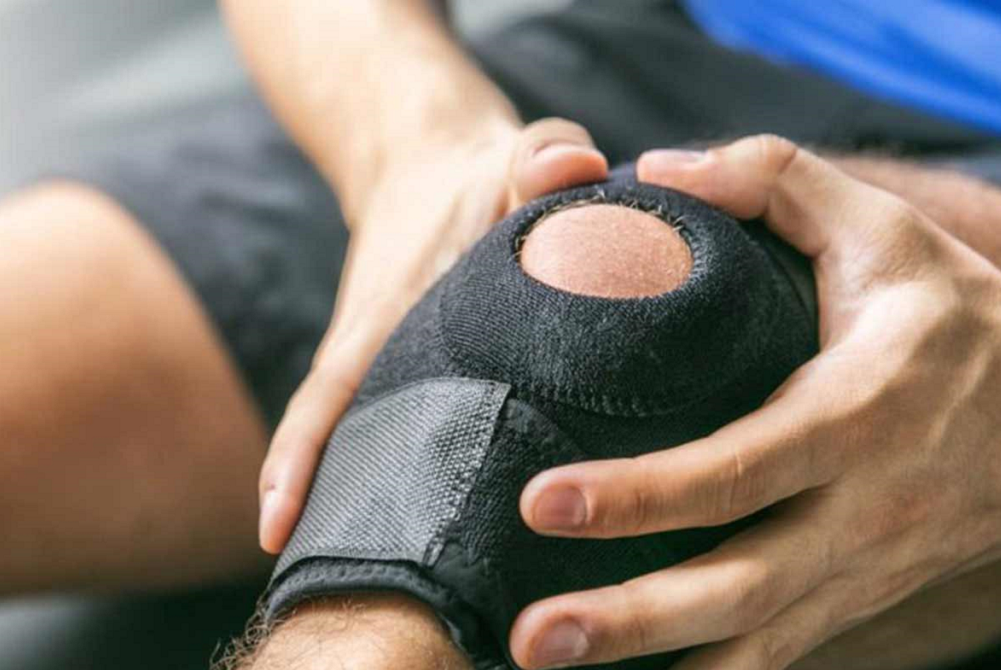
Summer Is Peak Time For Outdoor Sports Injuries
June 6, 2023
Summertime is the ideal time for outdoor activities like boating, swimming, barbecues and picnicking. It’s also ripe for sports injuries, says Nancy White, M.D., a Henry Ford Health sports medicine physician.
 “We encourage people of all ages to get outside and take advantage of all the activities available during the summer. It’s very important, though, that people keep safety top of mind to reduce their risk of injury,” Dr. White says.
“We encourage people of all ages to get outside and take advantage of all the activities available during the summer. It’s very important, though, that people keep safety top of mind to reduce their risk of injury,” Dr. White says.
Dr. White counts these as the five most common injuries:
- Sprains and strains
- Fractures
- Trampoline injuries
- Bike injuries
- Overuse injuries
“Trampoline injuries are mostly caused by jumping, either by an awkward landing or colliding with someone,” Dr. White says. “Overuse injuries happen when someone overextends themselves in a particular activity, whether it’s attending multiple sports camps or simply exercising outdoors.”
Dr. White recommends these three tips for reducing your risk of injury:
- Stay hydrated. Replenish your fluid intake with frequent water breaks.
- Perform warm-up exercises before your run or your game.
- Wear protective gear. Whether bike riding, rollerblading or skateboarding, a helmet and protective pads are a must. Obey traffic laws and store your phone away.
For soft-tissue injuries strains and sprains, Dr. White says the R.I.C.E. method is an immediate at-home treatment you can apply to reduce swelling and pain. It stands for Rest, Ice, Compression and Elevation. Over-the-counter anti-inflammatory medicine, such as ibuprofen (like Advil) or acetaminophen (like Tylenol), can help too.
If the pain worsens to the point that it interferes with your usual activities or sleep, make an appointment with your doctor or a sports medicine doctor.
Seek medical attention immediately if your pain was caused by a particularly forceful impact, you suspect a broken bone, or if the injury is accompanied by:
- Significant swelling
- Redness
- Tenderness and warmth around the joint
- Significant pain
- Fever
For injuries that don’t improve and require medical attention, visit henryford.com/sports and request an appointment with a Henry Ford sports medicine doctor.
Dr. Nancy White is a sports medicine doctor seeing patients at Henry Ford Medical Center-Columbus in Novi and at the William Clay Ford Center for Athletic Medicine in midtown Detroit.

Why Spring Sports Injuries Are Common & How To Prevent Them
April 11, 2023
When spring is in the air, athletes of all ages head outdoors to play their favorite sports, including softball, baseball, tennis, lacrosse and track & field.
 Unfortunately, the change of season also ushers in injuries, says Joseph Medellin, M.D., a primary care sports medicine doctor at Henry Ford Medical Center-Jackson. A variety of factors can cause spring sports injuries, including:
Unfortunately, the change of season also ushers in injuries, says Joseph Medellin, M.D., a primary care sports medicine doctor at Henry Ford Medical Center-Jackson. A variety of factors can cause spring sports injuries, including:
► Too much or too little winter activity: With shorter days and colder temperatures, some athletes aren’t as active in winter. Even if you are going to the gym regularly, sport-specific muscles – like muscles in the chest and shoulder that help you throw a baseball – may weaken.
At the start of a new sports season, a sudden increase in the demand on these muscles can lead to injury. Taking steps to get ready for spring sports before the season starts can lower this risk. It’s also not uncommon for multi-sport athletes to have games and practices year-round with multiple practices in one day. Not allowing yourself enough downtime can lead to overuse injuries, including strains and sprains.
► Transitioning outdoors: Winter sports often take place on hard surfaces, like wood basketball courts, gyms and treadmills. These surfaces are flat, making it easier to maintain your footing. Spring sports involve soft running surfaces like grass and turf that are uneven. They can also be wet, muddy or icy due to spring weather. All these circumstances increase the risk of injury due to falls.
Cold weather can also be a factor. Early spring temperatures can still be quite cold. It takes longer for muscles to warm up, and they might not work as efficiently. This can be especially troublesome with sports like softball where there are lulls in activity between innings. Playing with cold muscles can increase the risk of sprains and strains.
► Sport-specific movements: Throwing, sprinting and kicking are moves that most people don’t do on a daily basis. They require powerful motions that can stress unconditioned muscles and joints. This is especially true if you haven’t been cross-training to strengthen supporting muscles or haven’t gradually increased your intensity.
A sprinter may experience hip pain from running at full speed around the curve of a track. Rotator cuff injuries can occur in sports that involve throwing, like the javelin, shot put, and baseball and softball. Soccer players can pull their groin from repeatedly taking long kicks.
If You Suspect A Sports Injury, Don’t Put Off Care
A doctor’s office is often the last place eager athletes want to be at the start of the season. But pain should not be a regular part of your training program. If you think you’ve sustained an injury, trying to push through often makes it worse.
Making time to see the doctor can be challenging, especially if you have to miss a practice or game for your appointment. But it’s worth it. “The sooner you get evaluated, the sooner we can get you on the path to recovery,” Dr. Medellin says.
The opposite can be said when treatments are delayed. “The longer you’ve had an injury, the longer it may take to heal,” explains Dr. Medellin. “And first-line treatments aren’t as likely to be successful, which can mean more time away from your sport.”
Sports Injury Treatments That Keep You In The Game
Seeing a doctor doesn’t always mean you’ll have to sit out the season. Treatment may include intermittent rest, as long as you don’t have a severe injury like a stress fracture or tendon tear. “We may recommend a return to sport at a lower intensity or with additional rest days to see if the pain goes away,” says Dr. Medellin.
Patients with minor injuries might also benefit from physical therapy between practices. Physical therapists can correct poor form. They can also help you safely stretch and strengthen injured muscles to promote healing. Conditioning through Henry Ford Health's sports performance program can also speed recovery and prevent injury.
“A sports medicine doctor’s goal is to keep athletes active and involved in the sport they love,” says Dr. Medellin. “That’s what I want for my patients.”
To find a sports medicine provider at Henry Ford Health, visit henryford.com/sportsmedicine or call 313-651-1969.
Joseph Medellin, M.D., is a primary care sports medicine doctor at Henry Ford Medical Center-Jackson.

